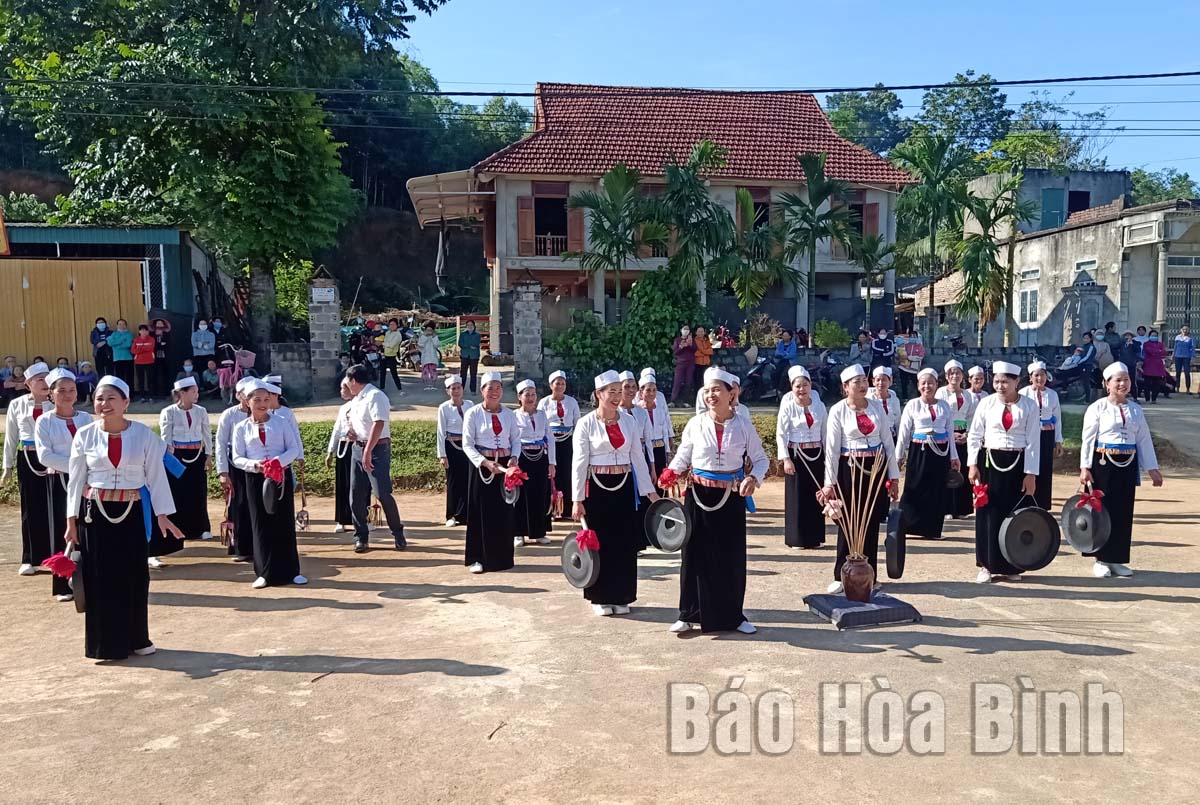
(HBO) - The Women's Union of Yen Thuy District’s Lac Thinh commune has launched a club in Trac hamlet which aims to preserve and promote the cultural identity of the Muong ethnic group.
Photo: Members of the club
practice beating Muong gongs in Trac hamlet, Lac Thinh commune, Yen Thuy
district.
The club has 31 members, including 29 women, who are the core of the local
cultural and artistic movement. The main activities of the club are collecting,
practicing, and restoring folk songs, traditional games and customs, brocade
weaving and making traditional dishes.
Quach Thi Kieu, head of the club, said that right after its establishment, the
unit maintains regular activities on Saturday and Sunday evenings at the
hamlet’s community house.
joining the club, the newcomers are taught how to beat Muong gongs, practice
dancing and singing folk songs, she said, adding that they also have chances to
attend exchanges focusing on brocade weaving as well as the role of traditional
national costumes.
Kieu said that the establishment
of the club is not only useful for women in the hamlet but also contributes to
preserving and promoting the nation's traditional culture.
Nguyen Thi Minh Huyen, Chairwoman of the Women's Union of Lac Thinh Commune,
said due to the negative effect of the market economy, some cultural features
of the Muong ethnic group have been lost, many young people do not know folk
songs and dances, how to play gongs, or wear traditional costumes properly.
To preserve and promote the national cultural identity, the commune Women's
Union has mobilised members to join the club. Club activities focus on
strengthening the cultural identity of the Muong ethnic group through costumes,
culture and art. The establishment and maintenance of club activities serve as
a cultural playground for its members and local residents, promoting the spirit
of solidarity, encouraging them to observe the guidelines of the Party,
policies and laws of the State, building a cultural family and residential
areas, and joining hands to turn Lac Thinh into a prosperous and civilised
homeland./.
With an increasingly vibrant and widespread emulation movement aimed at building cultured residential areas and cultured families, Yen Thuy District has been making steady progress toward improving both the material and spiritual well-being of its people, while fostering a civilized, prosperous, beautiful, and progressive community.
Once lacking recreational spaces and community facilities, Residential Group 2 in Quynh Lam Ward (Hoa Binh City) has recently received attention for the construction of a new, spacious, and fully equipped cultural house. The project followed the model of state support combined with public contributions in both labor and funding.
The "All people unite to build cultural life" movement, which has been effectively integrated with Kim Boi district’s socio-economic development goals, is fostering a lively spirit of emulation across local residential areas, hamlets, villages, public agencies, and enterprises. In addition, through the initiative, traditional cultural values are being preserved and promoted, while community solidarity and mutual support in poverty reduction and economic development are being strengthened.
A working delegation of the Hoa Binh provincial People’s Committee led by its Permanent Vice Chairman Nguyen Van Toan on June 11 inspected the progress of a project to build the Mo Muong Cultural Heritage Conservation Space linked to tourism services in Hop Phong commune, Cao Phong district.
Born and growing in the heroic land of Muong Dong, Dinh Thi Kieu Dung, a resident in Bo town of Kim Boi district, in her childhood was nurtured by the sweet lullabies of her grandmother and mother. These melodies deeply imprinted on her soul, becoming an inseparable part of her love for her ethnic group's culture. For over 20 years, this love for her hometown has driven Dung to research, collect, and pass down the cultural values of the Muong people to future generations.
In the final days of May, the Ethnic Art Troupe of Hoa Binh Province organized performances to serve the people in remote, mountainous, and particularly disadvantaged areas within the province. These were not just ordinary artistic shows, but they were the meaningful journeys aimed at spreading cultural values, enhancing the spiritual life of the people and contributing to the preservation of ethnic minority cultural identities.



